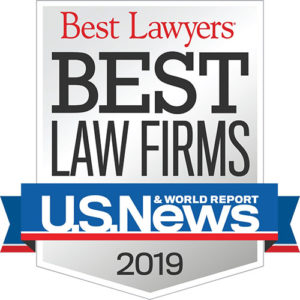As PA counties move into the green phase of reopening and non-essential business commences, employers and business owners in PA have many questions. We have compiled and answered some the most important questions below.
by Employment Attorneys James B. Shrimp and Thomas D. Rees
1. My business has reopened and I have an employee that HAS tested positive for COVID-19. What are my options?
The legal answer to this question depends upon the size of your business. You should also look to CDC guidelines regarding additional cleaning of the workplace and any contact tracing and additional quarantine of employees that is recommended. The answers below can also apply to employees that have recently been exposed to another person who has the coronavirus.
A. Businesses with 500 or more employees
There are no enhanced paid leave benefits. Your HR department should apply its PTO and unpaid time off policies, with the understanding that CDC guidelines likely require a period of quarantine for the employee. It would not be advisable to terminate the employee during this period of quarantine.
B. Businesses with Under 500 employees
The employee may be entitled to two (2) weeks of paid sick leave.
The Families First Coronavirus Response Act (“Act”) was the first coronavirus related legislation passed by Congress. The Act seeks to address the impact of coronavirus in a number of areas – including certain employee benefits.
The Act applies to employers with under 500 employees. Employers with under 50 employees are entitled to seek an exemption from the Department of Labor, if providing the benefits provided by the Act would put the employer out of business.
The Act provides two new paid benefits which expire on December 31, 2020:
- A two-week paid sick leave for coronavirus related illness; and
- Up to 12 weeks of paid Family and Medical Leave for caring for a child whose school or child care provider has closed.
Who Can Take advantage of the two-week paid sick leave?
- This benefit is for employees who are unable to work (or telework) because the employee is subject to a governmentally mandated quarantine or isolation order;
- has been advised by a health care provider to self-quarantine;
- has symptoms of being infected with coronavirus and is seeking a medical diagnosis;
- is caring for an individual who is quarantined or self-quarantining;
- is caring for a son or daughter if the school or place of care has been closed.
If any of the circumstances above apply, the employee is eligible for two (2) weeks of full pay, based on his/her typically schedule. There is a maximum benefit of $511 per day.
If the employee has employer based sick time/PTO, the employer is required to apply the government emergency leave, before applying the employer based benefit.
The employer is reimbursed via a payroll tax credit, which will be provided by the Federal government within 3 months. If the employer pays more in paid benefits and health insurance premiums than the payroll tax, the government will send the employer an “overpayment” check for the difference.
C. Other Employees
The employer is entitled to screen employees for Covid related symptoms. See EEOC Guidance - “What You Should Know About COVID-19 and the ADA, the Rehabilitation Act, and Other EEO Laws,” (April 23, 2020).
2. My business has re-opened and I have an employee that HAD COVID-19. What steps should I take?
You are entitled to require a return to work note from the employee’s physician. Once you receive the return to work note, that employee is permitted to return to work and should be treated like all other employees.
3. Due to Schools and Childcare Centers being closed, my employees cannot get into work. What are my options?
The answer to this question depends upon the size of your business.
A. 500 or more employees
There are no enhanced paid leave benefits. Your HR department should apply its PTO and unpaid time off policies. If the employee’s PTO has exhausted and there is no unpaid time off policy that would apply, the employee has no right to continued employment. Ensure that terminations made under these circumstances are done in a non-discriminatory fashion.
B. Under 500 employees
The employee may be entitled to twelve (12) weeks of Family and Medical Leave.
The Families First Coronavirus Response Act (“Act”) was the first coronavirus related legislation passed by Congress. The Act seeks to address the impact of coronavirus in a number of areas – including certain employee benefits.
The Act applies to employers with under 500 employees. Employers with under 50 employees are entitled to seek an exemption from the Department of Labor, if providing the benefits provided by the Act would put the employer out of business.
The Act provides two new paid benefits which expire on December 31, 2020:
- A two-week paid sick leave for coronavirus related illness; and
- Up to 12 weeks of paid Family and Medical Leave for caring for a child whose school or child care provider has closed.
Pertinent to the question posed is the twelve weeks of paid Family and Medical Leave.
This benefit is available for employees who are unable to work (or telework) because the employee must care for children (up to 18 years old) whose schools or child care facilities have closed because of the coronavirus.
The employee is eligible for up to 12 weeks of two-thirds pay, with health insurance. The maximum benefit is $200 per day and $10,000 total. The first two weeks of this leave may be unpaid (that gap is filled by the Paid Sick Leave benefit).
The employer is reimbursed via a payroll tax credit, which will be provided by the Federal government within 3 months. If the employer pays more in paid benefits and health insurance premiums than the payroll tax, the government will send the employer an “overpayment” check for the difference.
4. My business is ready to reopen but I several employees tell me that they have underlying health conditions; what are my options?
If the health condition qualifies as a disability under the Americans with Disabilities Act, you need to provide the employee with a reasonable accommodation to returning to work, so long as the accommodation does not create undue difficulty or cost for you.
The first step is to find out whether the employee’s condition interferes with the employee’s ability to perform major life activities (e.g., asthma impairs breathing). The next step is to discuss various accommodations, since the ADA requires employer and employee to engage in an interactive process. The type of accommodation depends on the nature of the employee’s job. Possible accommodations include continued work from home; work in a protected area (either a separate part of the office or work behind shielding); work when others are not present (staggered hours); or a reasonable modification of duties, including a possible exchange of duties with other employees.
Reasonable accommodation does not require an employer to fundamentally alter the basic qualifications for a job (minimum skills, licensure). Be sure to document all discussions with the employee and all steps taken to accommodate the employee.
5. My business is ready to reopen but have an employee who feels uncomfortable returning to the workplace because of COVID-19; what are my options?
It is wise to ask the employee the reasons for discomfort. A refusal to come to work just because someone feels uncomfortable is not a legitimate excuse. But the discomfort may have underlying causes that may constitute a disability under the Americans with Disabilities Act. You may ask the employee for medical reasons for the discomfort; this inquiry is job related and consistent with business necessity under the ADA. The inquiry may uncover a psychological reason for the employee’s concerns, such as generalized anxiety disorder or post traumatic stress syndrome. Or there may be a medical reason for the concern, such as an underlying condition that makes the employee susceptible to COVID-19. If the employee can document a condition that constitutes a disability, then you should try to work out a reasonable accommodation that allows the person to work with some degree of separation from the office. However, if the employee cannot document the condition, you may require the employee to come into work, and you may treat the refusal to come to work as a voluntary quit that precludes the employee’s receipt of unemployment compensation
6. We are ready to reopen but the nature of my business makes social distancing very difficult; what can I do?
Many businesses face this issue, particularly stores that have inventory in small spaces (drugstores, coffee shops, bookstores). The first step is of course to require the wearing of masks at all times. State governments have already imposed this requirement. The second step would be to take whatever steps can reasonably be taken to increase social distancing. These could include such steps as staggered hours; staggered breaks; setting up one-way corridors or spaces in the office; setting up zones in the office that specific individuals would cover; and having plenty of disinfecting wipes and hand sanitizers around. Some businesses may be able to transact customer business through a window opening onto the street or to use curbside delivery. You may need to be extra careful to require any employee with any illness to stay away from work. Each business has its own different needs. It will be wise to establish written guidelines to minimize close social contact and to post those guidelines for both employers and employees. Remember that you have the duty to have a safe workplace and written guidelines will help you show that you have fulfilled this duty.
7. I am re-opening my business - do I need to offer masks to my employees?
In Pennsylvania, employers are required to provide non-medical masks to employees and are required to ensure that customers wear masks as well.
8. Do I need to update my employee manuals with Covid (general pandemic) information before hiring new employees?
No. As an employer, you can update your employee manuals/policies at any time. Therefore, if you are re-opening and you need additional staff, do not slow hiring to get additional policies in place.
With that said, once your business is up and running at all cylinders, it is worth sitting down with your business lawyer to discuss what revisions and additions you might want to make to your employee manual.
9. My employee refuses to come back to work because they are receiving more money on unemployment compensation as a result of the $600 per week federal supplement. Can employees do this?
An employee “can” do this, but he/she will lose the entitlement to future unemployment benefits. The employee should know that the $600 per week federal supplement expires at the end of July and currently there is no appetite in the United States Senate to extend this supplement, for the very reasons stated in the question.
If an employee refuses to come back to work, you should advise the employee in writing that since he/she has refused to return to work, that he/she is being terminated for job abandonment. You should then notify the bureau of unemployment compensation that the employee refused to return to work and was terminated for job abandonment.
10. Employees have asked me whether the shelter in place order counts against my sick or vacation time; what should my response be?
A shelter in place order will almost never count against preexisting leave entitlements offered by an employer. A shelter in place order will qualify an employee for paid sick leave if the order prevents the employee from doing work that the employer has for the employee. This means that if the shelter in place order keeps an employee from being able to work or telework, and the you have work for the employee, the employee may get paid sick leave. If either of these requirements are not met, either because the employee can telework or you have no work for the employee, then the shutdown will not enable the employee to receive paid sick leave.
Paid sick leave is additional to whatever leave your employee has under your business’ leave policies. In rare situations, an employer and employee may agree to combine paid sick leave under the Emergency Paid Sick Leave Act and paid leave under the employer’s policies, where the addition will increase the employee’s compensation. The rules for family leave under the Emergency Family and Medical Leave Expansion Act give employers a little more flexibility. Employers may require employees to use up paid regular paid vacation and personal leave (but not sick or medical leave) concurrently with family leave; again, this helps to close the compensation gap between paid family leave (maxing out at $200 per day and $10,000 aggregate) and full paid leave under the employer’s plans.






 High Swartz LLP
High Swartz LLP


